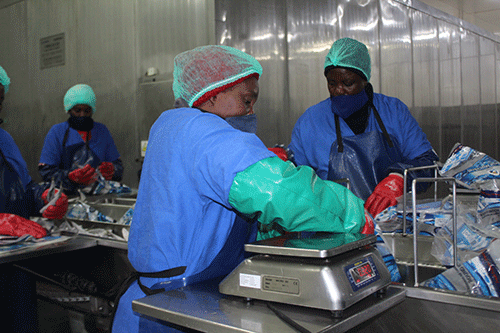WALVIS BAY – The future of more than 2 000 workers employed in the local fishing industry continues to hang in the balance as consultations linger on whether to allocate more wet quota to land-based horse mackerel players.
Those calling for an increased wet landed quota argue they have invested over N$2 billion in processing factories and catching vessels to create more jobs.
However, the Wet Landed Horse Mackerel Association (WLHMA) wants more wet allocations, arguing the current 60% freezer and 40% wet quota allocation model is not sufficient for them to operate optimally.
The association has been petitioning fisheries minister Albert Kawana for months over the issue.
According to Kawana, the issue of allocations in this sector needs further consultations, based on the challenges highlighted during his meeting with the industry players last week.
“Basically, the needs of the market are telling us how we should do it.
“According to the sector that I have consulted with during my visit, 80% of the market wants horse mackerel as it is. They need the fish from head to tail still attached. This is according to the industry,” Kawana told New Era yesterday.
He added horse mackerel is a low-value fish that is mostly consumed in remote areas in countries such as Zambia, Namibia, Democratic Republic of Congo and Zimbabwe.
According to him, those consuming the fish in these countries want it as it is.
“That is according to the industry. The issue here is, what needs to be value-added in such a situation? They eat it in remote areas to encourage fish consumption. However, we are still consulting the process, as I am waiting for proposals from the industry,” Kawana added. The wet landed sector, however, differs with this approach.
During the consultation with the minister, the sector said they invested more than N$2 billion and created more than 2 000 jobs in the sector and thus want to see it grow.
According to the association, they want 50% of the total allowable catch of horse mackerel to be allocated to shore-based processing facilities this year and volumes increased by 10% per year until the 70-40 ratio is reached in 2023.
“The issue here is not value-addition – and there is a misconception with regard to it. There is no way that we can add value to horse mackerel. We only want more fish to be brought onshore for processing, [which] translates into more jobs,” president of the association Jason Angala said yesterday.
According to Angala, more jobs are created in land-based factories through sorting, freezing and packing at factories instead of sending it directly from the vessels as in the case of the freezer sector.
The association also, during the consultation, pointed out that fish processed and frozen at sea are not transported by land because the finished product is shipped at sea to bigger cargo vessels. “This, in theory, could have created transport opportunities for more than 80 trucks. Only five multinational companies in the world buy and tranship fish at sea, which means that the conglomerate can control the price at which processed horse mackerel is sold,” the association said in their presentation.
According to the association, this means these companies control the price at which Namibia can sell its fish on the international market.
However, if more fish is processed on shore, Namibians will be able to determine the price at which the resource is sold locally and on the international market. Namibia currently has three horse mackerel processing factories, namely: Seaflower Pelagic Processing, Gendev and Tunacor, which are all operational at Walvis Bay.
A freezer quota is when the fish caught by vessels is exported without processing, while a wet quota refers to the catch that is processed on land at a processing plant in the country, thus creating or sustaining jobs.
- edeklerk@nepc.com.na


